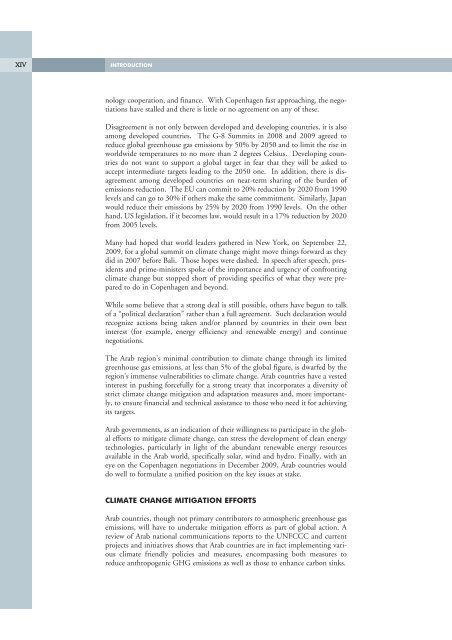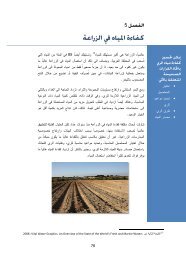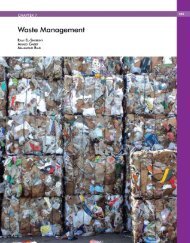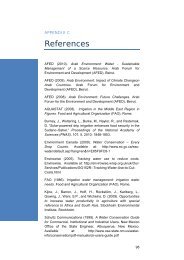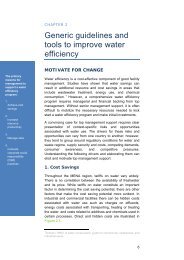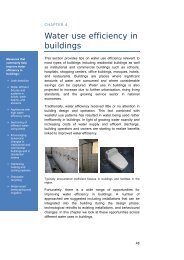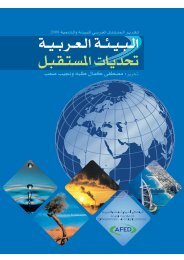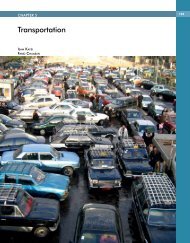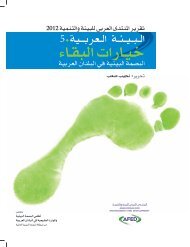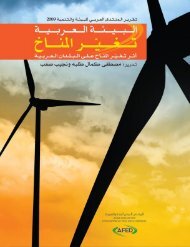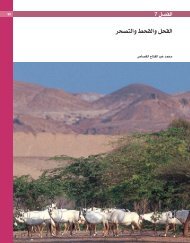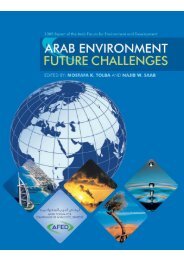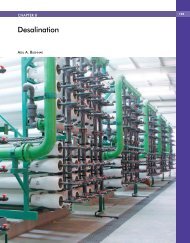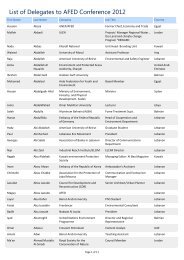Impact of Climate Change on Arab Countries - (IPCC) - Working ...
Impact of Climate Change on Arab Countries - (IPCC) - Working ...
Impact of Climate Change on Arab Countries - (IPCC) - Working ...
Create successful ePaper yourself
Turn your PDF publications into a flip-book with our unique Google optimized e-Paper software.
XIV<br />
INTRODUCTION<br />
nology cooperati<strong>on</strong>, and finance. With Copenhagen fast approaching, the negotiati<strong>on</strong>s<br />
have stalled and there is little or no agreement <strong>on</strong> any <str<strong>on</strong>g>of</str<strong>on</strong>g> these.<br />
Disagreement is not <strong>on</strong>ly between developed and developing countries, it is also<br />
am<strong>on</strong>g developed countries. The G-8 Summits in 2008 and 2009 agreed to<br />
reduce global greenhouse gas emissi<strong>on</strong>s by 50% by 2050 and to limit the rise in<br />
worldwide temperatures to no more than 2 degrees Celsius. Developing countries<br />
do not want to support a global target in fear that they will be asked to<br />
accept intermediate targets leading to the 2050 <strong>on</strong>e. In additi<strong>on</strong>, there is disagreement<br />
am<strong>on</strong>g developed countries <strong>on</strong> near-term sharing <str<strong>on</strong>g>of</str<strong>on</strong>g> the burden <str<strong>on</strong>g>of</str<strong>on</strong>g><br />
emissi<strong>on</strong>s reducti<strong>on</strong>. The EU can commit to 20% reducti<strong>on</strong> by 2020 from 1990<br />
levels and can go to 30% if others make the same commitment. Similarly, Japan<br />
would reduce their emissi<strong>on</strong>s by 25% by 2020 from 1990 levels. On the other<br />
hand, US legislati<strong>on</strong>, if it becomes law, would result in a 17% reducti<strong>on</strong> by 2020<br />
from 2005 levels.<br />
Many had hoped that world leaders gathered in New York, <strong>on</strong> September 22,<br />
2009, for a global summit <strong>on</strong> climate change might move things forward as they<br />
did in 2007 before Bali. Those hopes were dashed. In speech after speech, presidents<br />
and prime-ministers spoke <str<strong>on</strong>g>of</str<strong>on</strong>g> the importance and urgency <str<strong>on</strong>g>of</str<strong>on</strong>g> c<strong>on</strong>fr<strong>on</strong>ting<br />
climate change but stopped short <str<strong>on</strong>g>of</str<strong>on</strong>g> providing specifics <str<strong>on</strong>g>of</str<strong>on</strong>g> what they were prepared<br />
to do in Copenhagen and bey<strong>on</strong>d.<br />
While some believe that a str<strong>on</strong>g deal is still possible, others have begun to talk<br />
<str<strong>on</strong>g>of</str<strong>on</strong>g> a “political declarati<strong>on</strong>” rather than a full agreement. Such declarati<strong>on</strong> would<br />
recognize acti<strong>on</strong>s being taken and/or planned by countries in their own best<br />
interest (for example, energy efficiency and renewable energy) and c<strong>on</strong>tinue<br />
negotiati<strong>on</strong>s.<br />
The <strong>Arab</strong> regi<strong>on</strong>'s minimal c<strong>on</strong>tributi<strong>on</strong> to climate change through its limited<br />
greenhouse gas emissi<strong>on</strong>s, at less than 5% <str<strong>on</strong>g>of</str<strong>on</strong>g> the global figure, is dwarfed by the<br />
regi<strong>on</strong>'s immense vulnerabilities to climate change. <strong>Arab</strong> countries have a vested<br />
interest in pushing forcefully for a str<strong>on</strong>g treaty that incorporates a diversity <str<strong>on</strong>g>of</str<strong>on</strong>g><br />
strict climate change mitigati<strong>on</strong> and adaptati<strong>on</strong> measures and, more importantly,<br />
to ensure financial and technical assistance to those who need it for achieving<br />
its targets.<br />
<strong>Arab</strong> governments, as an indicati<strong>on</strong> <str<strong>on</strong>g>of</str<strong>on</strong>g> their willingness to participate in the global<br />
efforts to mitigate climate change, can stress the development <str<strong>on</strong>g>of</str<strong>on</strong>g> clean energy<br />
technologies, particularly in light <str<strong>on</strong>g>of</str<strong>on</strong>g> the abundant renewable energy resources<br />
available in the <strong>Arab</strong> world, specifically solar, wind and hydro. Finally, with an<br />
eye <strong>on</strong> the Copenhagen negotiati<strong>on</strong>s in December 2009, <strong>Arab</strong> countries would<br />
do well to formulate a unified positi<strong>on</strong> <strong>on</strong> the key issues at stake.<br />
CLIMATE CHANGE MITIGATION EFFORTS<br />
<strong>Arab</strong> countries, though not primary c<strong>on</strong>tributors to atmospheric greenhouse gas<br />
emissi<strong>on</strong>s, will have to undertake mitigati<strong>on</strong> efforts as part <str<strong>on</strong>g>of</str<strong>on</strong>g> global acti<strong>on</strong>. A<br />
review <str<strong>on</strong>g>of</str<strong>on</strong>g> <strong>Arab</strong> nati<strong>on</strong>al communicati<strong>on</strong>s reports to the UNFCCC and current<br />
projects and initiatives shows that <strong>Arab</strong> countries are in fact implementing various<br />
climate friendly policies and measures, encompassing both measures to<br />
reduce anthropogenic GHG emissi<strong>on</strong>s as well as those to enhance carb<strong>on</strong> sinks.


